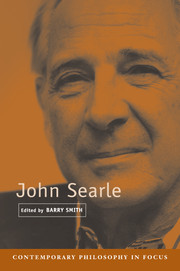Book contents
- Frontmatter
- Contents
- List of Contributors
- 1 John Searle: From Speech Acts to Social Reality
- 2 From Speech Acts to Speech Activity
- 3 Intentions, Promises, and Obligations
- 4 Law
- 5 Action
- 6 Consciousness
- 7 The Intentionality of Perception
- 8 Sense Data
- 9 The Limits of Expressibility
- 10 The Chinese Room Argument
- 11 Searle, Derrida, and the Ends of Phenomenology
- Further Reading
- Index
9 - The Limits of Expressibility
Published online by Cambridge University Press: 05 June 2012
- Frontmatter
- Contents
- List of Contributors
- 1 John Searle: From Speech Acts to Social Reality
- 2 From Speech Acts to Speech Activity
- 3 Intentions, Promises, and Obligations
- 4 Law
- 5 Action
- 6 Consciousness
- 7 The Intentionality of Perception
- 8 Sense Data
- 9 The Limits of Expressibility
- 10 The Chinese Room Argument
- 11 Searle, Derrida, and the Ends of Phenomenology
- Further Reading
- Index
Summary
THE DETERMINATION VIEW
A basic tenet of contemporary semantics is that the meaning of a sentence determines its truth conditions. This determination of truth conditions by linguistic meaning can be more or less direct. In nonindexical cases, the meaning of the sentence directly determines (and can even be equated to) its truth conditions. The sentence ‘Snow is white’ means that, and is true if and only if, snow is white. To give the meaning of such a sentence is to give its truth conditions. When the sentence is indexical, the situation is more complex. The sentence has truth conditions only ‘with respect to context’. The sentence ‘I am English’ uttered by John is true if and only if John is English; uttered by Paul, it is true if and only if Paul is English, and so forth. Still, the truth conditions, in each context, are determined by the meaning of the sentence (with respect to the context). The meaning of ‘I am English’ determines that, if that sentence is uttered by a, then it is true if and only if a is English.
The thesis that meaning determines truth conditions can be dubbed the Determination View. It goes largely unquestioned in contemporary analytic philosophy (as it did in early analytic philosophy). Fifty years ago, the situation was different. So-called ordinary language philosophers rejected the Determination View.
- Type
- Chapter
- Information
- John Searle , pp. 189 - 213Publisher: Cambridge University PressPrint publication year: 2003
- 12
- Cited by



